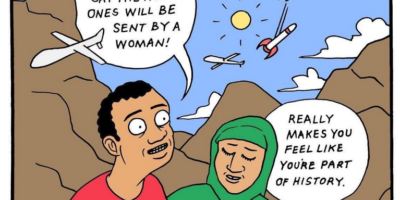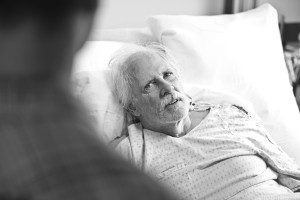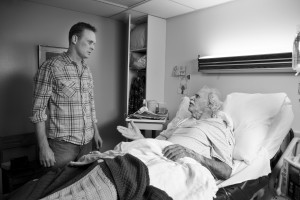The Hollywood legend discusses acting, family, and Alex Trebek
By Jennifer Miller
When Hitting the Cycle’s principal photography in Lexington concluded last summer, filmmaker J. Richey Nash intended to shoot the final two scenes on a hospital soundstage in Los Angeles. Yet again, like the movie’s anti-hero Jimmy “Rip” Ripley, Nash learned that there’s no place like home: University of Kentucky HealthCare, which previously hosted two HTC overnight shoots in its hallways and lobbies, provided exceptional access to a transitioning patient area at UK Good Samaritan Hospital.
For this shoot, the West Coast representatives on Team HTC now included Hollywood royal Bruce Dern, playing James Ripley, Senior. While cinephiles can rattle off dozens of Dern’s memorable performances—ranging from blue-blood Tom Buchanan opposite Robert Redford in The Great Gatsby, to his Oscar-nominated turn as a Vietnam Vet in Hal Ashby’s Coming Home, to his recent portrayal of polygamous patriarch Frank Harlow on HBO’s Big Love—twenty-somethings on the HTC set admired Dern even more for his real-life role as the father of acclaimed actress Laura Dern.
A family tradition on the silver screen veered far from Dern’s own upbringing in a family distinguished in more conformist fields. His father was a corporate leader in Chicago, his paternal grandfather was the first non-Mormon Governor of Utah and a U.S. Secretary of War. Dern’s maternal uncle won three Pulitzer prizes, was awarded the Presidential Medal of Freedom, and served as the first Librarian of Congress. Dern’s godparents: Adlai Stevenson (twice the Democratic nominee for President) and First Lady Eleanor Roosevelt. Heady stuff.
Dern graduated from the Ivy League University of Pennsylvania after the New Trier High School in Winnetka, Illinois. The public school is famous as the backdrop for many John Hughes films in the 1980s, and the alma mater of an astonishing range of celebrities, including Rock Hudson, Ann-Margret, Ralph Bellamy, Charlton Heston, Hugh O’Brian, Liz Phair, Bobbi Brown, Donald Rumsfeld, and Ari and Rahm Emanuel.
Dern’s disparate school experiences affected his perspective on societal assumptions, and helped shape his personal goals. As he explains, “I went to Choate [an elite boarding school in Connecticut] my first two years because my parents thought I hung out with the wrong kind of kids in grade school in Glencoe. They sent me to Choate to shape up and be with the right kind of boys. I got there, and I met 500 of the unhappiest kids I ever met in my life, who were in prep school since they were 5 years old. I didn’t like that. And they knew how to cut a corner better than anybody that ever went to New Trier.”
Dern shared with North of Center these thoughts and many others—the film production, family, acting, and politics—after finishing two days of work from a hospital bed on the HTC set. The conversation was intended as a traditional Q and A, but, as you already may have figured out, Bruce Dern rarely follows conventional expectations. Below are some excerpts, in Dern’s own words, from the pseudo-interview.
On Dern’s upcoming film project with his daughter Laura and ex-wife Diane Ladd:
Laura and her mother have done seven films together. In three of them, they got nominated for Academy Awards. I’ve been nominated, but never in a movie with them. I’ve done a couple with Miss Diane, but I haven’t done one with Laura, and we’re getting ready to do that. The thing that’s nice about the families here is that families support it; that’s not always the case in the movie business. When we got our stars on Hollywood Boulevard in November, we were the first family—mother, father, and child—to ever get separate stars on the Boulevard, and we’re also the only family to have all three members nominated for multiple Academy Awards.
I’m sorry it’s taken Laura and I this long, but we never found a piece of material. Now we have a magical piece of material called Hart’s Location. It’s a place where everybody alive has a chance to get to. Unfortunately, it’s not on the map. When Laura said, “But, Dad, where is it? How do I get to it?” “You’ll know when you’re there.” If you’re lucky and you tell the truth to the people in your lives, and your family and all around you close what you really feel, honest feelings about everything, and everybody’s up front about it, and nobody hides things, buries things, and refuses to talk about the tough issues. If you do all that the right way, then you have a chance to find Hart’s Location.
[In Hitting the Cycle, the father and son] didn’t get it. They got each other, but they didn’t really get each other. It’s a good metaphor. That’s one of the wonderful things about the movie, is the metaphor.
On flying to Kentucky to play the estranged father of a struggling professional baseball player:
I liked the role, I liked the baseball metaphor for a story. I liked the story, and the fact that I made a running movie once called On the Edge with a similar kind of, you know, nobody does it on their own, nobody does it by themselves. And I like movies about guys that maybe don’t quite get there. This is a movie about a guy who got there and couldn’t stay there. And I’ve always thought that people who have great ability and they say, well, he got hurt, and he couldn’t do this, and he couldn’t do that, well, it’s the sum total of who you are. You can have all the ability in the world, but if you’re going to make the Hall of Fame you got to do it for a long time. And this had a semblance of that.
On his oft-repeated claim that “you’re only as good as your next picture”:
That’s what an actor has to say. That’s not the truth, but an actor’s got to look forward. He can’t look back, because in looking back you settle for what’s been done. I’m always ready to look forward because I want to know what I’m doing next and how good I can be, and better than I was the last time.
Acting is real simple—it’s hard to do, hard to learn, but my premise for acting is very simple, that is, having the ability to be publicly private. If you’re willing to pull your heartstrings, open it up, and talk from yourself, one from the heart, if you will, you can make it, and be really big. It gives everybody alive a chance to be an actor or actress, because we all have a bank of memories, and thoughts, and feelings, and if we’re willing to draw on our own things like that, we can make a difference. And if you can’t, then you should be Alex Trebek and do game shows.
- Hitting the Cycle co-stars Bruce Dern and J. Richey Nash.
On his experiences with Team HTC:
From the minute I got off the plane, with the exception of the weather–but I’m from Chicago originally, so it’s nothing new—I’ve been impressed, I’ve been happy, I’ve had fun…I enjoy Richey very much… He’s a wonderful man. And the thing I like about that is, it’s not just that he’s well-bred. His folks get it, so he gets it. That’s a key. [Assistant] Wendy [Guerrero] and I both work with a lot of people that don’t get it. They don’t understand that there’s no “I” in the word team. Movies are the ultimate teamwork. You’re only as good as your partner on the screen, off the screen. You’re only as good as the people in your department that help you. There can’t be any egos on the set, except the right kind of ego—dignity and so forth…
I think everybody on this crew—first of all, I didn’t see one asshole. Except maybe myself. I didn’t see any screw-ups. I didn’t see anybody who wasn’t ready to get ready to be prime-time in their department. The organization of it was fabulous. I think there’s a lot of hope for this group of people. If I was a filmmaker and I wanted to come down here I’d keep this group together. I think anybody around Lexington, or in this part of Kentucky, ought to really study and look at the names of the people who were on this crew, and how it moved, ‘cause it’s a little army. All movies are. You become a family. The sad part about it is, when you get on a bigger and bigger level, you make a movie and then you never see those people again.
Crews are different, especially in independent film. If a company can keep that crew together, boy, you can do some stuff down the road, because everybody understands everybody else.
On turning a topical question about baseball into a meditation on family and filmmaking:
It’s bred here. There’s something about honoring tradition, and this movie had a little tradition to it without a lot of traditional people. And I like that, I admire that…Here, you had a guy that, because of his family ethic, turned a crew into a family. It’s not easy to do. He’s a monument to this movie, his energy, his strength, his endurance, all the things that made all this work.
Family tradition + untraditional family = Team HTC, and Bruce Dern fits in well.





Vic Torino
I met Bruce at Choate. I was one of those unhappy kids he describes. I come from a monied, but dysfunctional family. Thank God for my baseball prowess at the High School and Collegiate level. It gave me some peace of mind, something that I could do better than Daddy. BTW, Bruce was a good guy back at Choate and I am honored to have known him way back then.